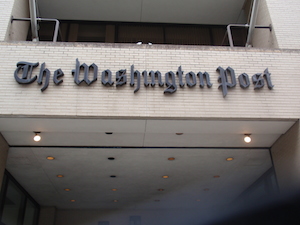Washington Post : a brief history
The newspaper that dominated Washington, DC into the 21 st century was founded in 1877 by Stilson Hutchins, a New Englander who later served as state representative in Missouri, to promote the agenda of the Democratic Party. Among others, the Post published Joseph Pulitzer and Theodore Roosevelt. But it fell on hard times and, in 1933, Republican financier Eugene Meyer bought it at bankruptcy auction. The paper, he said, was “mentally, morally, physically and in every other way bankrupt.” [1] Meyer set out to turn that around, and articulated the paper’s guiding principles, including “tell ALL the truth so as far as it can learn it.” [2]

In 1946, Meyer stepped down to become president of the International Bank of Reconstruction and Development. His son-in-law, Philip Graham, became publisher and, in 1947 when the Post incorporated, president. In 1963, Graham committed suicide and his widow, Katharine Meyer Graham, took over the Washington Post Company (which then included Newsweek ). Her son, Donald Graham, became publisher in 1979. In 2008, a fourth-generation Meyer descendant, Katharine Weymouth, was named publisher and CEO of a new division, Washington Post Media, which included the newspaper and washingtonpost.com; Donald Graham remained chairman and CEO of The Washington Post Company.
During the Meyer-Graham years, the Post broke numerous stories and built a reputation that reached well beyond the confines of Washington. In 1971, it played a part in publishing the celebrated Pentagon Papers, a 7,000-page top-secret study of US involvement in Indochina and the Vietnam War. A military analyst (Daniel Ellsberg) had leaked the documents to the New York Times. When a court temporarily enjoined the Times from further publication, the Post (which had obtained its own copy) published regardless. The US Supreme Court eventually found in favor of the two newspapers. As Justice Hugo Black wrote,
In my view, far from deserving condemnation for their courageous reporting, the New York Times , the Washington Post and other newspapers should be commended for serving the purpose that the Founding Fathers saw so clearly. In revealing the workings of government that led to the Vietnam War, the newspapers nobly did precisely that which the founders hoped and trusted they would do. [3]
After the Supreme Court ruling, Graham said “we are extremely gratified, not only from the point of view of newspapers, which was not the least of our concerns, but gratified from the point of view of government, and the public’s right to know, which is what we were concerned with.” [4]
A year later, the Watergate scandal brought the Post global renown. In 1972, Post reporters Carl Bernstein and Bob Woodward investigated a curious break-in at the Democratic National Committee headquarters in the Watergate apartment complex; they found it led to President Richard M. Nixon and his reelection campaign. By following a money trail and with the help of a federal source nicknamed “Deep Throat,” the two reporters uncovered numerous illegal activities. Two years later, Nixon resigned. The Post won a 1973 Pulitzer for its coverage of Watergate.
Not all Post reporting was of such import. The Post liked to define itself as a local paper, and it worked hard to cover responsibly the area where its readers lived. However, given that Washington was also the nation’s capital, “local” in its case often meant issues of national or international scope. With the growth of the Web and online publishing, Post readers increasingly came from all over the world. Not surprisingly, the paper had developed expertise in a topic that regularly drew attention: national security.
[1] Katharine Graham, Personal History (New York: Vintage), 1998, p. 61.
[2] Ibid , p. 63.
[3] New York Times Co. v. United States, 403 U.S. 713 (1873). See: http://www.law.cornell.edu/supremecourt/text/403/713
[4] John P. McKenzie, “Court Rules for Newspapers, 6-3,” Washington Post, July 1, 1971. See: http://www.washingtonpost.com/wp-srv/inatl/longterm/flash/july/pent71.htm